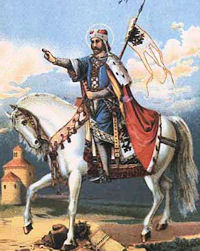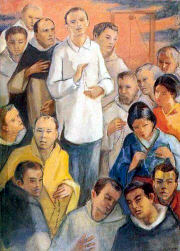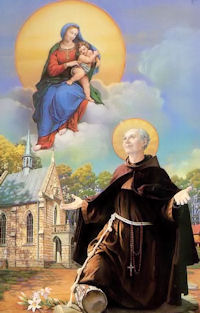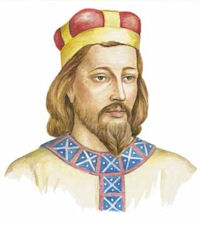Daily Readings for: September 28, 2012
(Readings on USCCB website)
Collect: O God, who taught the Martyr Saint Wenceslaus to place the heavenly Kingdom before an earthly one, grant through his prayers that, denying ourselves, we may hold fast to you with all our heart. Through our Lord Jesus Christ, your Son, who lives and reigns with you in the unity of the Holy Spirit, one God, for ever and ever.
Grant us, we pray, Lord God, the same perseverance shown by your Martyrs Saint Lawrence Ruiz and his companions in serving you and their neighbor, since those persecuted for the sake of righteousness are blessed in your Kingdom. Through our Lord Jesus Christ, your Son, who lives and reigns with you in the unity of the Holy Spirit, one God, for ever and ever.
RECIPES
ACTIVITIES
PRAYERS
Ordinary Time: September 28th
Optional Memorial of St. Wenceslaus, martyr; St. Lawrence Ruiz and Companions, martyrs
Old Calendar: St. Wenceslaus, martyr; Bl. John of Dukla (Hist)
St. Wenceslaus was Duke of Bohemia, who after many trials in governing and evangelizing his people, suffered martyrdom at the hands of his brother.
In the 17th century (1633-1637) St. Lawrence Ruiz and his companions shed their blood for Christ in Nagasaki, Japan. These martyrs were members of the Order of St. Dominic. They were nine priests, two religious, two sisters, and three laymen. Among the latter was Lawrence Ruiz, a family man from the Philippines. They abundantly sowed the missionary seed of Christianity with the example of their life and death.
Historically today is the feast of St. John of Dukla who was born in Dukla, Poland in 1414. He joined the Friars Minor Conventual, a religious order who strictly adhered to their rule of poverty and obedience. Though he went blind later in age he was able to prepare sermons with the help of an aide. His preaching was credited in bringing people back to the Church in his province. Soon after his death, there was an immediate at his tomb and several miracles were attributed to him. On June 10, 1997, he was canonized by Pope John Paul II in a mass at Krosno, Poland before approximately one million people.
St. Wenceslaus
St. Wenceslaus, duke of Bohemia, was born about the year 907 at Prague, Bohemia (now the Czech Republic). His father was killed in battle when he was young, leaving the kingdom to be ruled by his pagan mother. Wenceslaus was educated by his grandmother, Ludmilla, also a saint. She taught him to be a Christian and to be a good king. She was killed by pagan nobles before she saw him king, but she left him with a deep committment to the Christian faith.
 Throughout his life he preserved his virginity unblemished. As duke he was a father to his subjects, generous toward orphans, widows, and the poor. On his own shoulders he frequently carried wood to the houses of the needy. He often attended the funerals of the poor, ransomed captives, and visited those suffering in prison. He was filled with a deep reverence toward the clergy; with his own hands he sowed the wheat for making altar breads and pressed the grapes for the wine used in the Mass. During winter he would visit the churches barefoot through snow and ice, frequently leaving behind bloody footprints.
Throughout his life he preserved his virginity unblemished. As duke he was a father to his subjects, generous toward orphans, widows, and the poor. On his own shoulders he frequently carried wood to the houses of the needy. He often attended the funerals of the poor, ransomed captives, and visited those suffering in prison. He was filled with a deep reverence toward the clergy; with his own hands he sowed the wheat for making altar breads and pressed the grapes for the wine used in the Mass. During winter he would visit the churches barefoot through snow and ice, frequently leaving behind bloody footprints.
Wenceslaus was eighteen years old when he succeeded his father to the throne. Without regard for the opposition, he worked in close cooperation with the Church to convert his pagan country. He ended the persecution of Christians, built churches and brought back exiled priests. As king he gave an example of a devout life and of great Christian charity, with his people calling him "Good King" of Bohemia.
His brother Boleslaus, however, turned to paganism. One day he invited Wenceslaus to his house for a banquet. The next morning, on September 28, 929, as Wenceslaus was on the way to Mass, Boleslaus struck him down at the door of the church. Before he died, Wenceslaus forgave his brother and asked God's mercy for his soul. Although he was killed for political reasons, he is listed as a martyr since the dispute arose over his faith. This king, martyred at the age of twenty-two, is the national hero and patron of the Czech Republic. He is the first Slav to be canonized.
Patron: Bohemia; brewers; Czech Republic; Moravia.
Symbols: Armour; corn; black eagle; coffin held by angels; sword and purse; red banner charged with a white eagle; banner; staff; eagle on shield.
Things to Do:
- Learn more about Prague and the Czech Republic and St. Vitus Cathedral, supposedly started by St. Wenceslas in the 10th century as a small chapel to house relics of St. Vitus and where in the 14th century St. John Nepomucene was buried after being executed for refusing to violate the seal of the confessional.
- Teach your children the Christmas carol, Good King Wenceslas and discuss his life and virtue. If you can find a copy, a wonderful book with music and illustrations is called Good King Wenceslas: A Legend in Music and Pictures by Mary Reed Newland, published by Seabury Press, 1980.
- Read about the Infant Jesus of Prague and pray the chaplet.
- Bake a loaf of bread for dinner and serve wine in honor of St. Wenceslas.
St. Lawrence Ruiz
 Lawrence Ruiz is the first Filipino to be canonized a saint. He and 15 others were martyred at Nagasaki, Japan in 1637. The group included two consecrated women, two other laymen, two brothers and nine priests.
Lawrence Ruiz is the first Filipino to be canonized a saint. He and 15 others were martyred at Nagasaki, Japan in 1637. The group included two consecrated women, two other laymen, two brothers and nine priests.
Lawrence was born in Manila in the Philippines; his father was Chinese and his mother Filipino. He became associated with the Dominicans, and was a member of the Confraternity of the Holy Rosary. These Dominicans taught him Spanish, and from his parents he learned Chinese and Tagalog. He became a professional calligrapher and transcribed documents.
He married and had three children. In 1636, he fled the Philippines after being accused of murder. He joined a missionary group headed for Japan, where Catholics were being persecuted. It was soon found out that the members of this group were Catholic, so they were arrested and taken to Nagasaki. They were tortured for several days, first crushed while hanging upside down for three days, then the bodies were burned, with the ashes thrown into the Pacific Ocean on September 30, 1637. Pope John Paul II canonized these martyrs on October 18, 1987.
Symbols: martyr's crown; palm frond.
Things to Do:
Bl. John of Dukla
 St. John of Dukla was a Franciscan missionary who was born in Dukla, Galicia, Poland, around 1414 and grew up a deeply religious person. He began his religious life as a hermit but then entered the Conventual Franciscans and was ordained. From 1440-1463 he labored as a preacher, and he was elected superior of the monastery because of his holiness and sound judgment. After serving his term in the monastery, John traveled as a missionary to the area of Lvov, in the Ukraine. There a group of Observant Franciscans, called the Bernardines, were conducting their ministries. John was attracted by the Bernardine spirit and transferred to that branch of the order. He was stricken with blindness in the last years of his life, but he did not retire from his pastoral duties. John preached and found his way to the confessional by groping along the pews. He died in Lvov, on September 29, 1484, a beloved priest. He was beatified in 1733 by Pope Clement XII. Pope John Paul II canonized John in Krosno, Poland, on June 10, 1997.
St. John of Dukla was a Franciscan missionary who was born in Dukla, Galicia, Poland, around 1414 and grew up a deeply religious person. He began his religious life as a hermit but then entered the Conventual Franciscans and was ordained. From 1440-1463 he labored as a preacher, and he was elected superior of the monastery because of his holiness and sound judgment. After serving his term in the monastery, John traveled as a missionary to the area of Lvov, in the Ukraine. There a group of Observant Franciscans, called the Bernardines, were conducting their ministries. John was attracted by the Bernardine spirit and transferred to that branch of the order. He was stricken with blindness in the last years of his life, but he did not retire from his pastoral duties. John preached and found his way to the confessional by groping along the pews. He died in Lvov, on September 29, 1484, a beloved priest. He was beatified in 1733 by Pope Clement XII. Pope John Paul II canonized John in Krosno, Poland, on June 10, 1997.
— Excerpted from Our Sunday Visitor's Encyclopedia of Saints, Matthew Bunson, Margaret Bunson, Stephen Bunson

 Throughout his life he preserved his virginity unblemished. As duke he was a father to his subjects, generous toward orphans, widows, and the poor. On his own shoulders he frequently carried wood to the houses of the needy. He often attended the funerals of the poor, ransomed captives, and visited those suffering in prison. He was filled with a deep reverence toward the clergy; with his own hands he sowed the wheat for making altar breads and pressed the grapes for the wine used in the Mass. During winter he would visit the churches barefoot through snow and ice, frequently leaving behind bloody footprints.
Throughout his life he preserved his virginity unblemished. As duke he was a father to his subjects, generous toward orphans, widows, and the poor. On his own shoulders he frequently carried wood to the houses of the needy. He often attended the funerals of the poor, ransomed captives, and visited those suffering in prison. He was filled with a deep reverence toward the clergy; with his own hands he sowed the wheat for making altar breads and pressed the grapes for the wine used in the Mass. During winter he would visit the churches barefoot through snow and ice, frequently leaving behind bloody footprints.  Lawrence Ruiz is the first Filipino to be canonized a saint. He and 15 others were martyred at Nagasaki, Japan in 1637. The group included two consecrated women, two other laymen, two brothers and nine priests.
Lawrence Ruiz is the first Filipino to be canonized a saint. He and 15 others were martyred at Nagasaki, Japan in 1637. The group included two consecrated women, two other laymen, two brothers and nine priests.  St. John of Dukla was a Franciscan missionary who was born in Dukla, Galicia, Poland, around 1414 and grew up a deeply religious person. He began his religious life as a hermit but then entered the Conventual Franciscans and was ordained. From 1440-1463 he labored as a preacher, and he was elected superior of the monastery because of his holiness and sound judgment. After serving his term in the monastery, John traveled as a missionary to the area of Lvov, in the Ukraine. There a group of Observant Franciscans, called the Bernardines, were conducting their ministries. John was attracted by the Bernardine spirit and transferred to that branch of the order. He was stricken with blindness in the last years of his life, but he did not retire from his pastoral duties. John preached and found his way to the confessional by groping along the pews. He died in Lvov, on September 29, 1484, a beloved priest. He was beatified in 1733 by Pope Clement XII. Pope John Paul II canonized John in Krosno, Poland, on June 10, 1997.
St. John of Dukla was a Franciscan missionary who was born in Dukla, Galicia, Poland, around 1414 and grew up a deeply religious person. He began his religious life as a hermit but then entered the Conventual Franciscans and was ordained. From 1440-1463 he labored as a preacher, and he was elected superior of the monastery because of his holiness and sound judgment. After serving his term in the monastery, John traveled as a missionary to the area of Lvov, in the Ukraine. There a group of Observant Franciscans, called the Bernardines, were conducting their ministries. John was attracted by the Bernardine spirit and transferred to that branch of the order. He was stricken with blindness in the last years of his life, but he did not retire from his pastoral duties. John preached and found his way to the confessional by groping along the pews. He died in Lvov, on September 29, 1484, a beloved priest. He was beatified in 1733 by Pope Clement XII. Pope John Paul II canonized John in Krosno, Poland, on June 10, 1997.